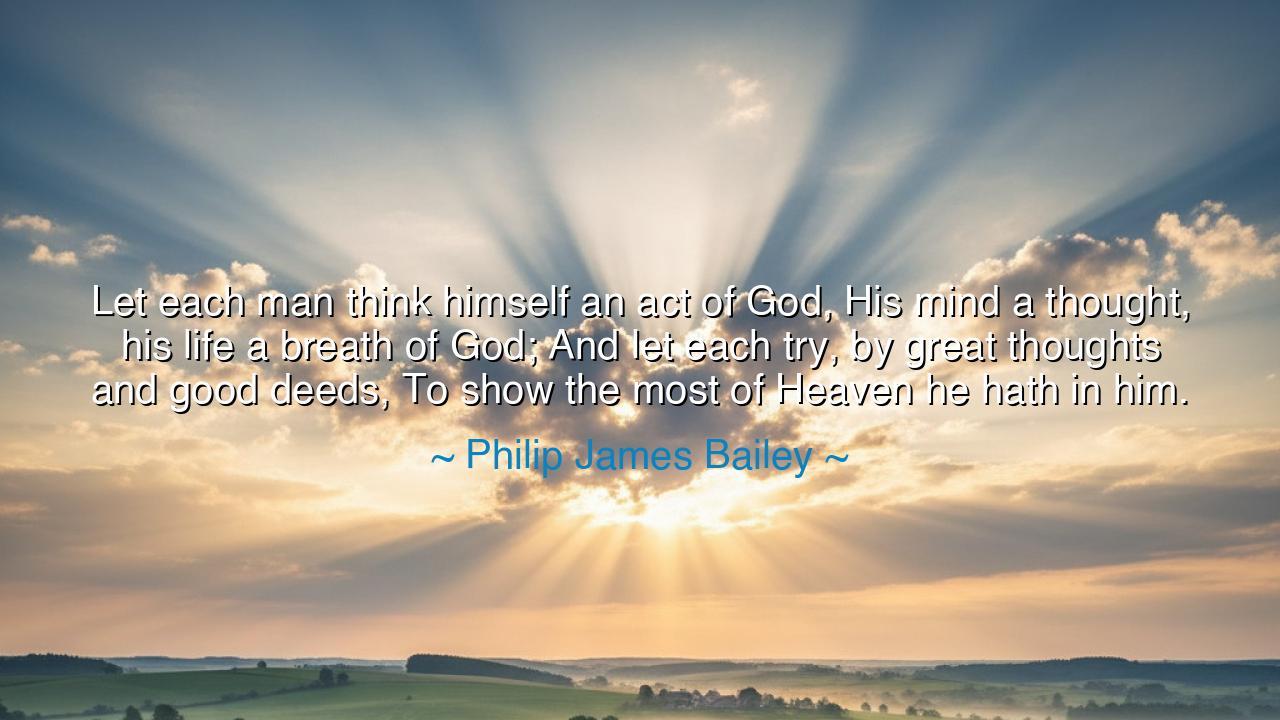
Let each man think himself an act of God, His mind a thought, his
Let each man think himself an act of God, His mind a thought, his life a breath of God; And let each try, by great thoughts and good deeds, To show the most of Heaven he hath in him.






“Let each man think himself an act of God, His mind a thought, his life a breath of God; And let each try, by great thoughts and good deeds, To show the most of Heaven he hath in him.” — Philip James Bailey
From the heart of the 19th century, when poets sought to reconcile faith and reason, spirit and science, Philip James Bailey wrote these radiant words—words that rise like a hymn to the divine potential of humanity. They come from his monumental poem Festus (1839), a vast and visionary work that sought to capture the dialogue between man, God, and eternity. In this passage, Bailey exhorts every soul to remember its divine origin, to see itself not as accident or dust alone, but as an act of God, a living embodiment of His will. “His mind a thought, his life a breath of God”—here, he declares that the human being is not separate from divinity but a fragment of it, a spark from the eternal fire.
Bailey’s words carry the tone of ancient prophets and mystics, echoing the wisdom of the Greeks, the Hebrews, and the sages of the East. To say “each man is an act of God” is to awaken the sacred dignity that lies dormant in every heart. For too long, humankind has measured itself by frailty and failure; Bailey urges us instead to see ourselves through the eyes of creation itself—as living manifestations of divine intent. The mind, he says, is not a random flicker of thought, but a thought of God; the life we breathe is not our own possession, but a breath of the Infinite. To realize this is to live with reverence, for it means that every action, however small, participates in the eternal rhythm of the universe.
But Bailey’s teaching is not one of pride or presumption; it is a call to responsibility. If each person is indeed a divine act, then each carries the burden of representing Heaven upon the earth. “Let each try, by great thoughts and good deeds, to show the most of Heaven he hath in him.” These are not the words of idle praise—they are a commandment of purpose. It is not enough to know that one is divine in essence; one must prove it through action—through the purity of thought, the nobility of deed, and the love that flows from both. In this way, Bailey weds faith to morality, spirit to service, reminding us that every human life is a mirror in which the divine may be seen more clearly—or obscured.
History has often revealed such souls—those who made visible the Heaven within them. Consider Florence Nightingale, the “Lady with the Lamp,” who in the filth and suffering of war refused despair. She saw not broken bodies, but divine lives worthy of care. Her great thoughts and good deeds turned compassion into discipline, and service into art. In her, the “breath of God” became tangible; she proved, as Bailey commands, that Heaven can be made visible through human hands. And so it has been with saints, reformers, and artists alike—each, in their time, revealing what portion of divinity was entrusted to them.
Yet Bailey’s vision reaches beyond the famous few. It speaks to every soul, reminding us that holiness is not confined to temples or prophets. The farmer who tills his field with honesty, the teacher who kindles minds, the mother who nurtures life—all these “show the Heaven within them.” The divine is not found in grandeur but in goodness; not in thunder, but in quiet persistence. For if God’s thought lives in us, then every pure intention, every kind act, is a revelation of His presence. To live thus is to transform existence into worship, and labor into prayer.
There is, in Bailey’s words, a subtle warning as well. Those who forget their divine origin live small lives, bound by fear, greed, and apathy. To see oneself as nothing but flesh is to live like dust, shifting with every wind. But to remember that one’s mind is a thought of God is to claim one’s true heritage—to act not as a beggar of fate, but as a co-creator with the Eternal. Such remembrance lifts the spirit from despair, for it places meaning even in struggle: every hardship becomes a test of how much Heaven we can reveal, even in darkness.
Therefore, O listener, take this teaching into your heart: you are an act of God. Your mind was shaped from His thought; your life moves with His breath. Let your thoughts be noble, for they are echoes of the Divine Mind. Let your deeds be just and kind, for they are the hands of Heaven made flesh. Seek not perfection, but purpose—to let the divine that dwells within you shine forth into the world. For in every act of love, every moment of courage, every choice for truth over falsehood, Heaven is revealed anew.
And when your days are done, may it be said of you—as Bailey might have wished for all humankind—that you lived as one who knew himself to be born of God’s thought, sustained by God’s breath, and faithful to God’s purpose—a mortal who, for a brief time, let the light of Heaven shine brightly upon the earth.






AAdministratorAdministrator
Welcome, honored guests. Please leave a comment, we will respond soon